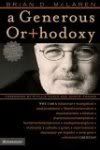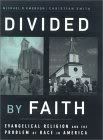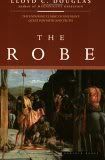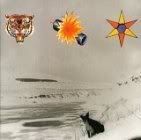 In chapter 9, "Why I Am Mystical/Poetic", McLaren outlines some of the limitations of reason when approaching theology, and highlights the need for using more poetic language and imaginative thinking. On page 152 he defines an approach that is "coherent (hanging together, making sense when its many parts are integrated), contextual (sensitive to its cultural and historic situation), conversational (never attempting to be the last word, and thus silence other voices, but rather inviting ongoing dialogue in the search for truth), and comprehensive (relating to all of life)" that I found really helpful.
In chapter 9, "Why I Am Mystical/Poetic", McLaren outlines some of the limitations of reason when approaching theology, and highlights the need for using more poetic language and imaginative thinking. On page 152 he defines an approach that is "coherent (hanging together, making sense when its many parts are integrated), contextual (sensitive to its cultural and historic situation), conversational (never attempting to be the last word, and thus silence other voices, but rather inviting ongoing dialogue in the search for truth), and comprehensive (relating to all of life)" that I found really helpful.
Chapter 10, "Why I Am Biblical", begins with an admission that he has been critiqued by friends who implied that he didn't hold the bible highly enough. My first thought was: Well, maybe there's a reason. And his stated belief that "it is a gift from God, inspired by God, to benefit us in the most important was possible: equipping us so that we can benefit others, so that we can play our part in the ongoing mission of God." immediately re-raised the question of his definition of mission; I'm not fully confident that his take on the gospel is much more than a social one. At risk of sounding like a broken record, I think it is, but also much more. It "equips us for good works", but it also proclaims the good news about salvation, and demands that we make a choice: Is Jesus lord? I believe there is Truth in the pages, not just wisdom for living better in community and suggestions for how to be good.
What did y'all think of the second paragraph on page 161 about the spirit in creation? I'm not sure what I think about the language of "permission to become". But I like his analogy to his own birth/creation- the product of a "complex synergy", not just biology or just God - and his extension to scripture, written by men writing in their own voice from their own context; I don't believe that God overrode their personality or just moved their hand over the page to get down on parchment his exact words.
I totally agree that Christians have been known to proof text and use scripture as a weapon in a way that completely contradicts love. Even in Christian circles, scripture has been used to squelch questions and doubt. We quote a bible verse (often out of context) as if it's all cut and dried, telling people to "just have more faith" rather than dealing with the difficult task of interpretation.
It is, as he states, a narrative, often descriptive rather than prescriptive, and using poetic forms that have layers of meaning far beyond simple propositional statements of truth.
What do you think of his analogies in dealing with some of the OT brutality? Are they helpful?
What do you think of some of the extrabiblical language that we use to describe the bible (inerrant, infallible, etc.)? Does it aid your understanding or hinder it?










5 comments:
I am not ready to post for this section yet. I need another day.
I just wrote a response to Janie's last comment. Sorry, I wasn't sure if I needed to carry that over into this section or if I needed to keep it over there. I chose the latter.
Talk to y'all soon!
I thought I'd write something about the Mystical/Poetic Chapter since it's an area of religion that fascinates me, and has since I was young. There's things I don't like about my old church, but I feel lucky to have been raised in a church where some of the more ancient poetic Christian traditions had their place.
Some of my earliest memories of church are of the symbols, iconography, altar, and stained glass windows in the church building. A sanctuary like that is like a poem laid out in space. I've been to churches where the interior of the worship space is plain, unadorned, without any iconography or symbolism. It just wasn't the same. I feel an acute lack of what some would call sacred space, like I would at my work desk or a lecture hall.
Of course, we all make judgments according to what we're used to or what we prefer. Art or poetry isn't as important to some people as it is to others. I've grown even fonder (in the absence) of things like liturgy, a seasonal church year, and the traditional church festivals where the congregation gets to re-live and re-experience the narratives of Christianity again through color, symbol, and ritual every year. (Not that liturgy, poetry, and iconography can't be made to be dead and oppressive in the wrong hands. I know from experience that it can.)
Much of Christianity that aims to be in the contemporary/modern category is a lot of things: lively, energetic, upbeat, popular in style, highly emotional, exciting. But, is it beautiful or poetic? And does that matter? I don't know.
(Aside rant: McLaren quoted G.K. Chesterton as saying that poets do not go mad or implying that madness and poetry have nothing to do with one another. I want to profoundly disagree with that assertion. Maybe not the poets Chesterton read. Emily Dickenson, Blake, the Romantics in general all were not typically sane. I consider Nietzsche to be a great poet of sorts, and he went mad. The ancient Greeks identified poetry with a kind of divine madness. Ok, end of aside rant.)
As for mysticism, mysticism is strange, mysterious. Because mysticism is personal, individual, not necessarily beholden to offical doctrine, the church authorities, or established rites and practices, it's somewhat wild. Because whatever is unpredictable or beyond the careful control of the authorities is considered by them to be dangerous, mysticism and mystics tend not to be trusted or liked by the powers that be in churches. (Until they are safely tamed by the authorities, usually after a mystic is safely dead.)
John the Baptist and the Hebrew prophets like Elijah were said to be mystics. From what is in the Gospels, the same could be said about Jesus, a man who is said to have often dwelt in lonely places to pray, a man who was convinced that he had received a message from God. Paul was convinced that he experienced visions of Jesus. When Christianity was first made the official religion of the Roman Empire in the 4th Century A.D., there was an out-flux of Christians out from society into the desert. These were the Christian mystics, hermits, and monks, the forerunners of Christian monasticism who thought that the unification of Church and State was going to somehow corrupt the very heart of what Jesus and his teachings were all about.
I just wanted to point out that elements of mysticism were very much a part of the earliest days of Christianity, even though it might be very unfamiliar to people now. It's also interesting to note that figures like Jesus, the Hebrew prophets, John the Baptist and Paul all were sort of like mystical outlaws with their own message and experience who operated outside of and many times in direct opposition to the official church authorities and established church power structure.
Final thought, Joseph Campbell wrote somewhere that in inter-faith conferences when the official clergy (priests, pastors, ministers, etc.) from different religions and Christian denominations meet, there is little they have to say to each other and they don't really understand each other. However, the different kinds of monks supposedly have no trouble getting along and relating to each other. I don't know if that's true, but I thought it was something interesting to think about.
Sorry, I strayed pretty far from anything you listed for the chapter. I really have nothing to say in my defense of that. ;) Feel free to get back on track, or for everyone else to bypass any of this and post in response to what you originally wrote for this chapter.
David-
I’ve shared your quote about sanctuaries being like a poem laid out in space several times… what a beautiful picture. I think that having such sterile places of worship is such a tragedy. I’ve never attended a church that wasn’t like that, actually, and I would love to have the experience of beauty, liturgy and ritual on a Sunday. God seems to care a lot about aesthetics (just look at the detail in which he described what He wanted His sanctuary to look like in the OT), and it’s a shame that we’ve lost some of that. For me, nature is my holiest place. Sitting on a rock, listening to birds sing, and staring at the Dent du Midi across the valley evoke the majesty of God to me in a way that no other place can. I value the teaching I receive during our chapel services, but I have a difficult time truly worshiping in that setting.
I wonder about mysticism being completely personal and individual. For it to be worship, it seems to need some sort of referent outside of the person doing it, otherwise it’s ultimately just worship of experience. I don’t know that it needs to be tethered to ‘official doctrine’, but I definitely think it needs to be tethered to truth. Which I don’t think diminishes the wildness of it… it opens it even wider. The people you cited as mystics did amazing things and had experiences far beyond what most of us will ever have, but it was never purely individualistic. Just my two cents…
I’ve shared your quote about sanctuaries being like a poem... what a beautiful picture.
Thanks.
Remember, expression through art was even more important for Christians of the past than it is for us today. It's easy for us to forget that most people all around the world and throughout history have been illiterate. When the common man came to a Christian church, much of what was going on and the meaning of the service, the ritual, and his religion was communicated to him or her visually through the symbols all around or by watching the drama of the church proceedings (as well as through hearing, smelling, and performing along in that drama. Most Christian churches today that we've experienced are much less an immersion in toto of the whole person than they would have been for all Christians hundreds of years ago. At that time each congregation would have had all their senses involved through things like incense, candle light, holy water, vestments, chanting, the practice of standing, sitting, kneeling, crossing oneself, etc.)
I agree, it's hard to beat nature when it comes to the sacred. As so would, I think Christians like St. Francis of Assisi or Pierre Teilhard de Chardin, as well figures like Emerson and the Romantics, Lao Tzu, and the native peoples of the Americas.
I don’t know that [mysticism] needs to be tethered to ‘official doctrine’, but I definitely think it needs to be tethered to truth.
Quoth Pilate, "What is truth?"
Sorry, couldn't resist.
I don't know that mysticism is something more individualistic than it is personal. But who really understands mysticism, anyway? Still, it seems to be the vitality of relgion. Trace back through the major figures of Christianity, Judaism, and the other religions of the world, and see if they don't all pretty much come down to the personal conviction of some truth as understood via some kind of mystical experience. Some kind of mysticism always seems to be present and important.
Good point about the historic use of visual narrative for illiterate people. We’ve almost just flip-flopped. Now we’ve got an extremely literate society, but the power of narrative (visual or otherwise) has slipped in the face of so much data. I think it’s regaining momentum as people are starting to re-emphasize the power of story, and I’m hopeful that it will lead to a more imaginative approach to life in general, including spirituality.
I think your point about the involvement of all the senses is important too. Christians (and religions in general) often create too sharp of a divide between the body and soul, and have made the bodily pleasures almost sinful. I think God created us to take such joy in our bodies – he made all things and declared them good. To try and cut off that part of ourselves, or diminish it too much, I believe can lead to an anemic spirituality. Still living, but lacking, you know?
I definitely don’t understand mysticism, and I agree with you that it’s highly personal and experiential by its very nature. I guess my point was mostly that it needs to be tied to the truth about who God is, the truth about who we are, and the relationship between us. So if my mystical experience leads me to a conviction about the truth of something that conflicts with the truths of scripture or am persuaded because of an experience to follow a course at odds with what is deemed good there, I would have to distrust my mystical experience. I believe that mystical experience is good and important, but definitely gets critiqued and trumped by God’s revealed word to us. There are boundaries, I think.
Post a Comment